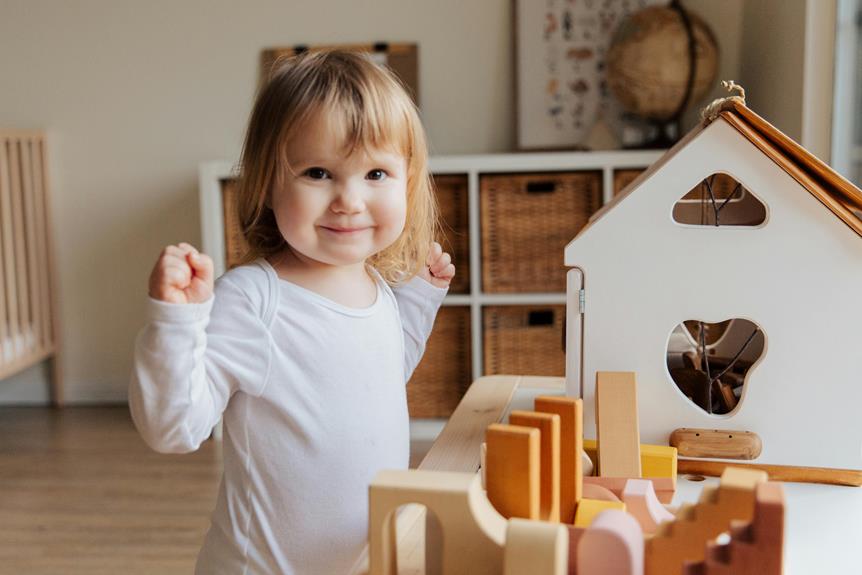
As a parent, you might wonder how sensory toys can impact your baby's growth and development. The tactile, visual, and auditory stimulation these toys provide can significantly influence various aspects of your little one's learning journey. From cognitive skills to emotional intelligence, the benefits of sensory toys are vast and can shape your baby's development in profound ways. But how exactly do these toys work their magic? Let's explore the fascinating world of sensory play and its impact on your baby's overall well-being.
Sensory Toys Enhance Cognitive Skills
Using sensory toys can significantly boost your baby's cognitive abilities. These toys engage your baby's senses, helping them explore the world around them in a stimulating way. When your baby interacts with sensory toys, they're encouraged to touch, see, hear, and sometimes even taste different textures, shapes, and sounds. This multi-sensory experience not only entertains your baby but also enhances their cognitive development.
As your baby plays with sensory toys, their brain is actively processing the information received through their senses. This process helps in building neural connections and pathways, which are crucial for learning and problem-solving skills. By engaging with sensory toys, your baby learns cause and effect, spatial awareness, and develops their memory and concentration.
Moreover, sensory toys promote sensory integration, allowing your baby to make sense of the information their senses are providing. This integration is essential for developing skills like hand-eye coordination, fine motor skills, and spatial awareness. Overall, incorporating sensory toys into your baby's playtime routine can have a lasting positive impact on their cognitive development.
Development of Motor Skills Through Play
Engaging in play activities with appropriate toys can help your baby develop essential motor skills necessary for their physical growth and coordination. Toys such as rattles, soft balls, and textured objects encourage your baby to reach, grasp, and manipulate objects, thus enhancing their fine motor skills. Activities like tummy time with sensory toys can strengthen your baby's neck, arm, and core muscles, laying the foundation for motor milestones like crawling and eventually walking.
Through play, your baby learns to coordinate movements, improve balance, and refine hand-eye coordination. Push and pull toys, as well as toys that encourage stacking and building, can aid in developing gross motor skills and spatial awareness. As your baby interacts with sensory toys that make sounds or have different textures, they engage multiple senses, further enhancing their sensory-motor integration.
Providing a variety of sensory toys and play experiences supports your baby's motor skill development, setting the stage for their physical competence and overall growth.
Social Skills Development With Sensory Toys
To foster social skills development in babies, incorporating sensory toys into playtime can greatly enhance their interactive abilities and communication skills. Sensory toys provide opportunities for babies to engage in interactive play with caregivers or peers, promoting social interactions from an early age. By encouraging turn-taking, sharing, and communication through sensory play, babies learn valuable social skills that are essential for building relationships in the future.
Through playing with sensory toys alongside others, babies also develop their ability to understand and respond to social cues, such as facial expressions and gestures. This heightened awareness of social signals contributes to improved social interactions and empathy. Additionally, sensory toys that involve cooperative play can help babies learn how to work together towards a common goal, fostering teamwork and collaboration skills.
Emotional Development and Sensory Play
Enhancing emotional development through sensory play can nurture a baby's understanding and management of their feelings. When engaging in sensory activities, babies experience different textures, sounds, and sensations, which can evoke various emotions. By exploring these stimuli, babies learn to recognize and express their feelings, laying a foundation for emotional intelligence.
Sensory play provides a safe environment for babies to explore and process their emotions. Through activities like squeezing a squishy toy or listening to calming music, babies can learn to self-regulate and find comfort during moments of distress. This process helps them develop coping mechanisms and resilience from an early age.
Moreover, sensory play encourages social-emotional development by fostering empathy and communication skills. When babies engage with others in sensory activities, they learn to share, take turns, and understand non-verbal cues, promoting healthy social interactions.




